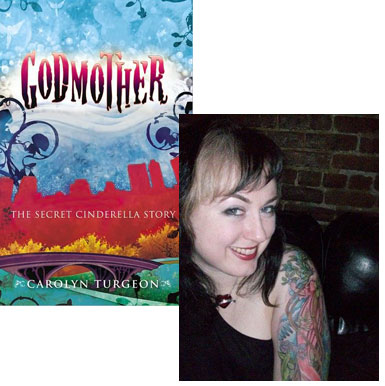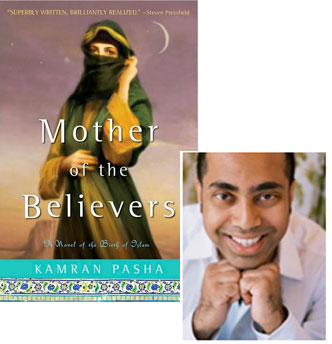Carolyn Turgeon: What Lies Beneath Cinderella

It’s been nearly two-and-a-half years since my friend Carolyn Turgeon wrote her first guest essay for Beatrice; the publication of her second novel, Godmother, is a perfect opportunity to hear from her again. (She’ll be reading from the novel at the Tribeca Barnes & Noble tonight at 7 p.m., if any of you reading this happen to be in New York City.) She offered to explain how she chose a familiar fairy tale as the basis for her story, and how she began diverging from the well-known story almost immediately…
When I started writing Godmother: The Secret Cinderella Story, I really just wanted to tell the Cinderella story straight-up. With lots of lush, shimmery language and images, lots of rich feeling, all kinds of twists and turns and secret little crevices of the story being revealed. I liked the idea of working with the Cinderella story, because: 1) it was already written, thus halving my work (I thought), and 2) it is just about the prettiest story in the world. Glass slippers and pumpkins and ball gowns and palaces!
And I’m not going to lie: the Cinderella that wormed its way into my deepest heart at a shockingly young age is the Disney one. No stepsisters cutting their heels off to fit into the shoes, no horrific comeuppances… and one puffy cheeked little fairy godmother flitting around to make all Cinderella’s dreams come true.
I also knew, right away, that any retelling of the Cinderella story I’d do would have to be sad. It’s a classic tale of longing: a young girl, abused, betrayed, lost, mistreated, her parents dead, stuck in the house of a woman who hates her, of her stepsisters who hate her, being forced to dress in rags and clean day and night, with nothing to do but imagine every single thing she’s lost or will never have. Her dead parents, her former happiness. The prince, the ball. Becoming someone new.
I have an enormous appreciation of longing. I’ve loved Leonard Cohen and Nick Cave since I was a teenager. I studied medieval Italian poetry in graduate school. I read about theologians and saints. I love quotes like this, from Nick Cave’s The Secret Life of the Love Song:
“We all experience within us what the Portuguese call Saudade, which translates as an inexplicable longing, an unnamed and enigmatic yearning of the soul and it is this feeling that lives in the realms of the imagination and inspiration and is the breeding ground for the sad song, for the Love Song. The Love Song is the light of God, deep down, blasting up through our wounds.”
So here is Cinderella, suffering, full of desire and Saudade. And the ball: it’s a real thing and also the object of every unnamed, inexplicable desire. Isn’t it? How is this poor, dirt-streaked girl going to get to the spectacular, otherworldly ball, anyway? How is she going to be transformed? It’s not the prince who saves Cinderella, after all. The prince just gets hot and bothered over a gorgeous girl in see-through shoes. It’s the fairy godmother who sees past the dirt, the pain and the heartbreak, to all the beauty hidden there.
26 March 2009 | guest authors |
Kamran Pasha: A Novel About Islam with Something to Offend Everyone

Last year, first-time novelist Sherry Jones inadvertently found herself at the center of a media controversy when Ballantine Books decided to cancel its contract with her to publish The Jewel of Medina, her version of the life of Aisha, the wife of the Muslim prophet Muhammad, citing fears that releasing the book would expose the publishing company to terrorist attacks. Beaufort Books quickly stepped in to bring the novel out, and faced no violent retribution for its actions (though somebody did try to firebomb the original British publisher). Meanwhile, Kamran Pasha—a Hollywood screenwriter currently working on the NBC drama Kings—watched and waited; his own novel about Aisha, Mother of the Believers, was scheduled for publication in April 2009 and, to their credit, Atria Books never backed down from its original support for his work.
“With my own novel coming out in a few days, it is inevitable that people ask whether I am worried that the book will generate controversy,” Pasha wrote recently. “My response is that I have no doubt that the book will generate controversy and create a passionate debate among both Muslims and non-Muslims, as there are aspects of my novel that will offend people in both communities.” He elaborates upon that statement in an essay I’m happy to be able to present to you here.
Aisha—the Prophet’s youngest wife, a scholar, a politician and a military commander—is revered throughout the Islamic community. Her life single-handedly challenges the prevalent stereotype of the oppressed and submissive Muslim woman, and she remains a role model for Muslim feminists today. But in researching her story, I found intriguing accounts that are probably unknown to many Muslims, and my inclusion of such events may upset some. One thing that might startle some Muslims is my suggestion that one of the main characters, Talha, an early follower of Prophet Muhammad, was in love with Aisha, even though it was unrequited.
Talha is a revered figure in Islam, but early Muslim sources suggest that he did have feelings for Aisha, and he once even publicly suggested that he would marry her if the Prophet died or divorced her (an incident I portray in the novel). Talha’s unwavering loyalty to Aisha led to his support for her military activities, and ultimately his death on the battlefield. Being raised as a Muslim, I had never heard these accounts and was startled to find them in the early Islamic histories. Most other Muslims don’t know these stories, either, and some might be offended at their inclusion in my novel.
Some Muslims might also be shocked at my (very light) treatment of sexuality in the story. There are no graphic scenes, but there is an open discussion of sex, which is true to Islamic history. Muslim historians had no problem talking openly about sex, even the Prophet’s sex life with his wives, and there are early accounts of one of his wives even discussing the fact that she had “wet dreams”. Traditionally Muslims had a very healthy attitude toward sex, as it was considered as a normal part of daily life. In modern day, under the heavy influence of British Victorian values left over from the colonization, some Muslims might find even my light treatment of sexuality too much.
So there will be things in my book that surprise and shock some Muslims. But there are many aspects of Mother of the Believers that will startle, and perhaps anger, non-Muslims as well. The story is told from a Muslim point of view and directly addresses many of the critiques raised against Prophet Muhammad by non-Muslims. The Prophet was a compelling spiritual figure who was famed for remarkable acts of generosity and compassion, and his words still ring true with wisdom today. But he has also been maligned by Westerners for many aspects of his life.
25 March 2009 | guest authors |

 Our Endless and Proper Work is my new book with Belt Publishing about starting (and sticking to) a productive writing practice.
Our Endless and Proper Work is my new book with Belt Publishing about starting (and sticking to) a productive writing practice. 
